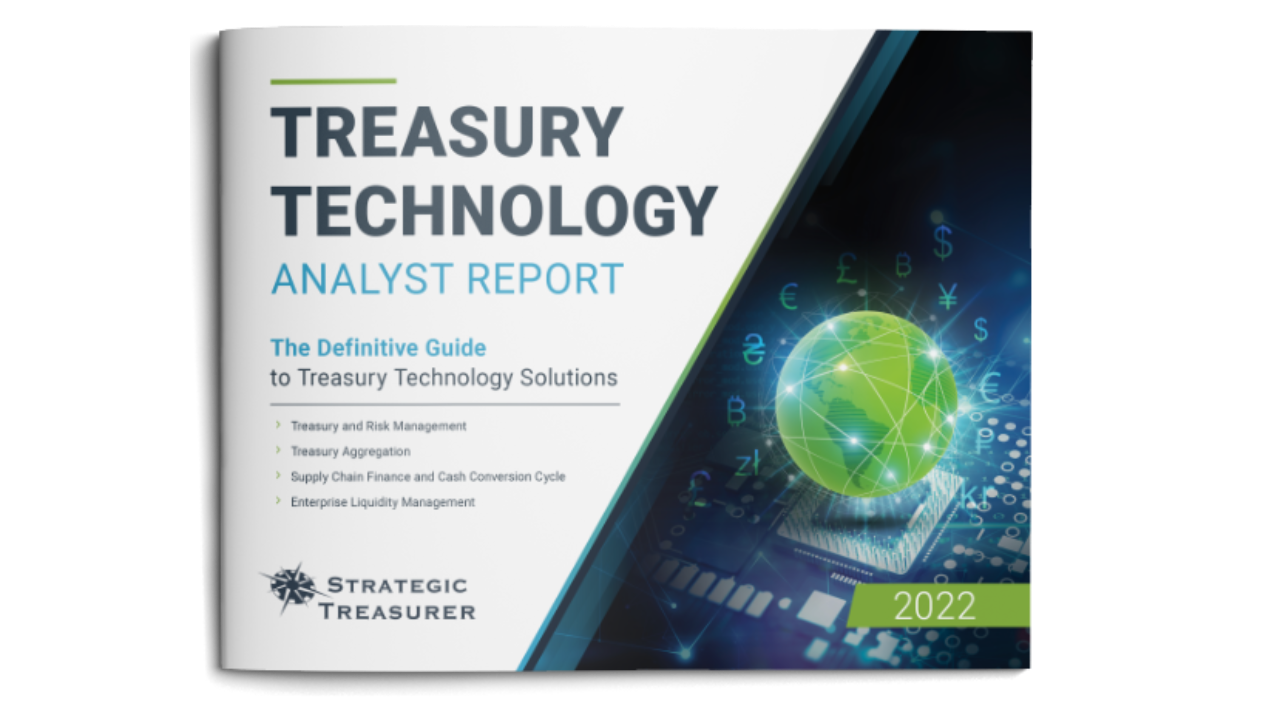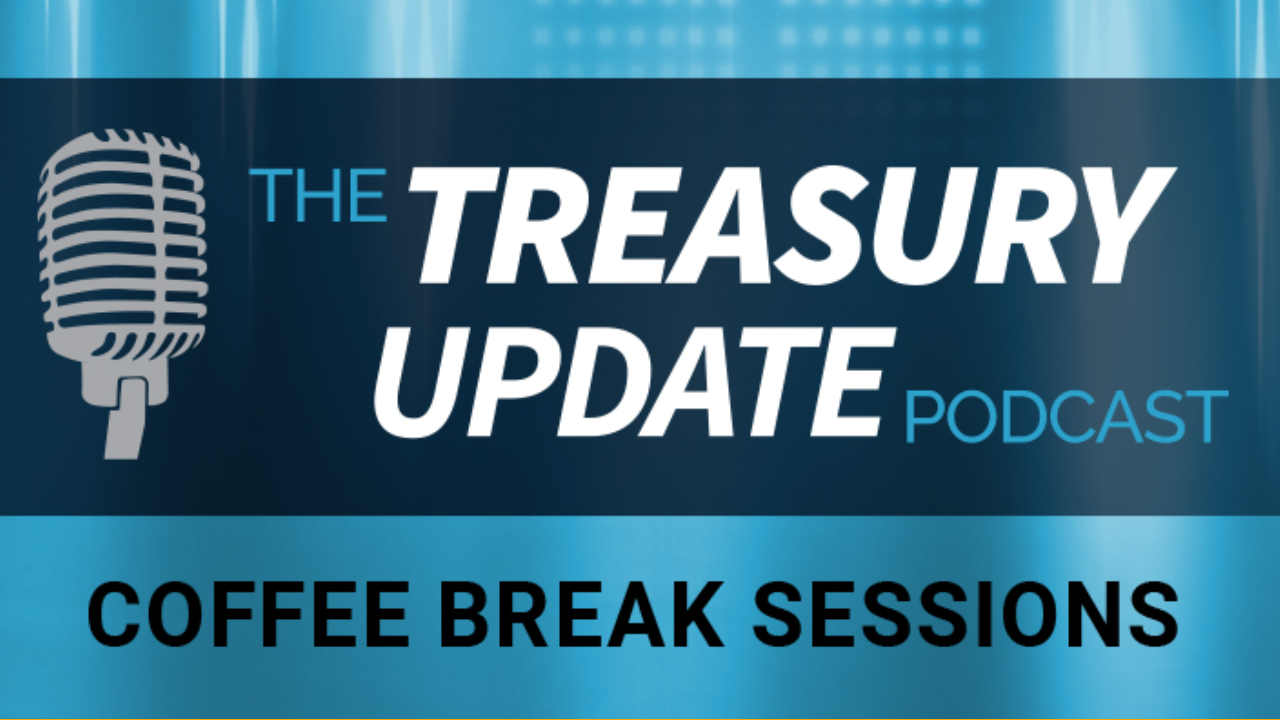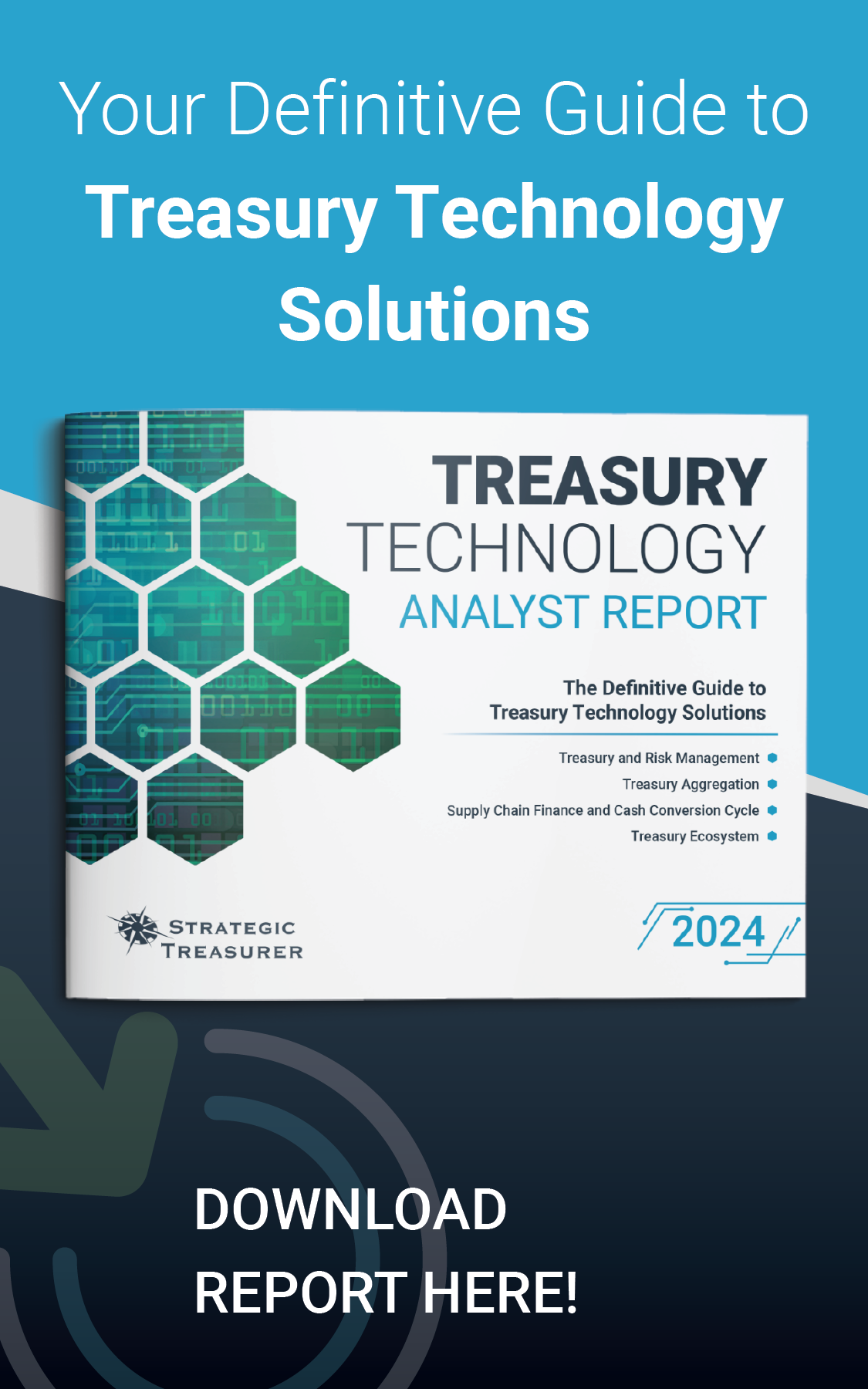
Session 90
Coffee Break Session: Decoding Earnings Credit Rate (ECR)
Join us in this week’s Coffee Break Session as Jason Campbell and Craig Jeffery unpack ECR’s significance, its direct connection to reserve requirements, and why treasury professionals should pay close attention to it. Discover the impact of shifting interest rates on earnings generated from balances and explore actionable steps to optimize banking relationships and effectively manage counterparty risk.
Visit StrategicTreasurer.com/ecr to gain access to a quarterly ECR report.
Host:
Jason Campbell, Strategic Treasurer


Speaker:
Craig Jeffery, Strategic Treasurer


Episode Transcription - (Coffee Break Session Series) - Episode 90 - Decoding Earnings Credit Rate (ECR)
Jason Campbell 00:03
Welcome to the Treasury Update Podcast Coffee Break Sessions presented by Strategic Treasurer covering foundational topics and core treasury issues in about the same amount of time it takes you to drink your cup of coffee. I’ll be your host Jason Campbell business development leader at Strategic Treasurer. Welcome to another great episode of the Coffee Break Sessions. I’m your host Jason Campbell, business development leader here at Strategic Treasurer. And joining me today is our managing partner and founder Craig Jeffery of Strategic Treasurer. Craig, welcome back to the show.
Craig Jeffery 00:34
Well, Jason, I am glad to be here, though I was forced to do so.
Jason Campbell 00:38
Absolutely. You were. I told you that you had no choice. This is what we’re doing on this particular day, right? Because it’s a great day to have a great day. And a great show, I might add on that one. And this subject today we’re going to talk about you and I have kind of gone back and forth. We did some webinars about it, you know, Strategic Treasurer has a has a great program around this particular topic. And to find out more, go to StrategicTreasurer.com and type this phrase in of earnings credit rate, otherwise known as ECR, and we’ve got a lot of great information on on our website. But hopefully in this Coffee Break Session, we will break it down a little bite sized piece for our listeners here, Craig. So I know that we have gone through several different conversations, talks, we’ve talked with many companies, many organizations, banks all across the US piece of it is always this thing about looking at rates and looking at what banking activity is going on right now with obviously with so many different changes between in federal in the in the federal government with the rate changes and T bill changes and things of that nature. There’s some kind of now there’s some impact for companies who are looking at their current banking relationships as it relates to their earnings credit rate. Let’s go into kind of educating our listeners a little bit more about it and kind of dive in and talk about what is, what is the ECR?
Craig Jeffery 01:50
Yeah, so the ECR is a US phenomenon. This is where instead of paying interest on a demand deposit account, for example, the company leaves balances in the account, they don’t want to really get into the history of why that’s been the case, why there’s not the ability to pay interest on demand deposit accounts, there’s not a way for banks to compensate by paying interest directly. And so an earnings credit rate is a way of providing some type of compensation based off of a rate and using that to reduce the fees that are charged, right. Because sometimes you can you can get services from banks and just pay for it by leaving a lot of money there. Or you can pay for it with particular fees that exist, you know, different parts of the world, of course, many, many parts of the world, you just pay for those fees. Or if you maintain a certain amount of activity, the bank goes and calculates and say, hey, the amount of money you leave here pays for the different services I have. And ECR is just a it’s a percentage rate that the bank will pay for the collected balances that you have. And they’ll use that to pay for those, the services up to the point where it covers all of it. If there’s extra, sometimes they have a way of rolling forward, but it’s a for some purposes, you’d look at it as here’s an interest rate that we’re getting for leaving balances there. It just happens to be applied to the charges we have.
Jason Campbell 03:15
Is there a reserve requirement to for how much money’s gotta be in there?
Craig Jeffery 03:19
Yeah, so the reserve requirement doesn’t exist right now, the reserve requirement is well it’s 0%. And this is a you know, for every, let’s say, every million dollars the bank takes in for a long time, it was for most of the history since about 1935, the reserve requirement, for the most part, was about 10%, for at least initial balances. And that meant if they took in a million dollars, they had to leave $100,000 in the bank, they could loan out $900,000. And so that was a way of handling that, right, maintaining a certain reserve to cover to cover capital needs. That adjusted, moved over a number of times, it reached, I think as high as 12% in the 90, early 90s, 92 to 94. And then since February of 2019, I believe right around there, is there’s no reserve requirement on that transaction account. So the the transaction counts, like operating accounts that you have, there’s no reserve requirement for that that type of activity. So it’s zero. And so how that factors into the discussion on earnings credit rate is a reserve requirement. If you had let’s say you had a 2% earnings credit rate, you had a million dollars over the course of the year, it would be $20,000. Well, that would be reduced, because the reserve requirement take that million dollars, make it $900,000. And so it’d be $180,000. When I say $180,000, I really mean $18,000. So I gotta remember what whether I was using 1 million or 10 million in my head. So it says that would be a way of lowering it, but there’s no there’s no reserve requirement for your operating accounts for the transaction account. So the stated rate for an ECR should apply to 100% of your collected balances.
Jason Campbell 05:01
So I know it just sounds like a lot of banking stuff going on here. And it seems more relevant from a banking standpoint there. So I guess my question to you is why should I treasury person even care about ECR?
Craig Jeffery 05:13
Well, I think broadly, a treasury person, a corporate treasurer should care about how banks are compensated and how you’re valuable to the relationship. And you’re valuable based on the fees you pay, the balances you maintain, the use of capital, the longevity of the relationship, that can be very beneficial to both. And it’s important to be important to the banks that you want to be important to, if I could say important enough. That that idea of . . .
Jason Campbell 05:42
I think it’s important that you do.
Craig Jeffery 05:47
Okay, it’s a great day for an important conversation. This is earnings you get on balances. So from a stewardship, you know, responsibility, it’s like, we don’t need to make sure we’re earning the right type of return on our balances. And it’s one way of compensating banks. So those are, those are some of the reasons, that’s why you should care about it, you should care about a lot more now, because rates have come up, since the central bank’s decided inflation is going up too much. And it’s no longer going to be transitory, we need to tamp that down, inflation is too high. So they’re raising rates very quickly. And that’s also changed the dynamics. If you’re going to earn three basis points, not a particularly big deal. But if it’s going to be, you can earn 3%, two and a half percent, it makes a lot more sense to pay attention to because that can be a substantial sum of money.
Jason Campbell 06:32
So I know that it was, you know, I think it’s becoming more relevant these days and talking with with folks within the industry. And the concern, you know, obviously is like, Hey, I realize that I should probably look at this, but it’s not important or it’s either a like, you know, I’m not trying to nickel and dime I want to make the relationship is weighs more than ECR does. And what a lot of folks understand is I think the conversation to have is fair market pricing, right. It’s always good to have a great relationship with your with your financial institution that you’re utilizing. But it’s also to make sure they have in spot checks to ensure that there’s fair market pricing that your that your gathering, that you’re getting from them and ensuring that you just haven’t those, again, those spot checks just to make sure everything is hunky dory. Right. I don’t know if you can say hunky dory, but I can say it, right. So what needs to be done as far as when we think about ECR?
Craig Jeffery 07:19
You know, we think about I guess one is the perspective of this is just one of the dials you use to compensate your banks. And it’s you have alternatives to leaving balances or at least to some extent for leaving balances. You know, what are you going to earn on your investments or your your unused cash on any given day? So there’s there’s alternatives that you have. So what needs to be done is the proper understanding of what it is. Two, because rates have changed quite a bit in the last year there’s been, is it nine or 10? I can’t remember how many times the Fed has raised their benchmark interest rate. Well, that’s had a significant impact on what’s going on. So benchmarking not only against the Fed funds rate, but other alternative short term investments, as well as what’s occurring in the banks, compensation of corporations who leave balances is important. You need to know what they’re paying, are you in the bottom quartile lower than the bottom quartile? Are you up around the third quartile? Are you being compensated properly for the balances you have, and that can be arranged, it doesn’t necessarily have to be a specific number. But if you don’t know where you are relative to others, that’s not a good advantage for a relationship or for managing your funds. So if you want to know how you’re compensating your bank, and how how that adds value to them, and how making the proper returns, you want to make sure you’re you’re benchmarking what you’re getting from an ECR perspective. The other thing needs to be done is how do we know what our target balances are if you, you’re leaving 50 million in a bank account, just because your forecast is not good, everything’s kept short, you have to have this huge extra margin or cushion, you may do better moving some of that out into other short term investments, or maybe longer, slightly longer investments, if you really don’t need that you’re just keeping the excess cushion. So that’s another another component. I think the other thing that needs to be done is we need to look at how you compensate your banks and the balances you maintain for ECR in light of counterparty risk management. We had a session before about counterparty risk management, if you’re leaving 10s of millions, hundreds of millions of dollars to compensate your bank to pay for your services. Well, now you’re exposed to the tune of 50 million or 100 million dollars that you’re leaving there to pay for this. So you’re in an exposed position. Everything’s great. It’s great. It’s great. You’re paying for that until it’s no longer great. And there’s a there’s a problem. So those are some of the things need to be done is know what know what’s going on, where you sit, what your alternatives are, and making sure you’re thinking about it from a counterparty risk standpoint, too. So now going back to as you know, outside of just ECR, but what are the topics do you feel would be related to this subject? And maybe perhaps is there just maybe some future podcast ideas we might throw out? Yeah, well, I mentioned counterparty risk management, that would be another another topic that that’s directly linked to it, because you’re keeping balances. And in countries where there’s some type of coverage of insurance coverage, anything above that amounts exposed, bank relationship management, how we value our relationships, how we monitor those. So there’s a number of things like risk adjusted return on capital, you understand how banks look at you, and how you compensate them. And so the overall bank relationship management would be another topic. Some of the other ones, then Jason would be related to investment earnings. So things like investment deposit accounts, collateralized deposit accounts, separately managed accounts, different types of funds of mutual funds. Across the board, there’s a range of short term, short term funds, could be short term bond funds, could be money market funds, institutional money market funds, there’s other alternatives to your short term cash. And I think those are, those are other topics that would be of interest. Because if you’re saying what are our alternatives, there’s a range. And none of these investments, or investment alternatives is perfect for every single season. So we need to understand what those are, where they may make sense.
Jason Campbell 11:27
I think we may have just extended our podcast roadmap with these ideas that you have. So thank you for sharing with us and giving us that food for thought. So Craig, again, thank you so much for joining us today. And to our listeners, please ensure to join us every first and third Thursday of the month for a new episode of the Coffee Break Sessions.
Craig Jeffery 11:44
Did you want to ask if they had any comments or thoughts about future podcasts to send a note to podcast@strategictreasurer.com?
Jason Campbell 11:52
That’s excellent. That’s a good point. That’s exactly what I was looking and hoping that you would say. So thanks, Craig, for that. Really do appreciate it. And again, thank you to our listeners, take care.
Announcer 12:05
This podcast is provided for informational purposes only, and statements made by Strategic Treasurer LLC on this podcast are not intended as legal, business, consulting, or tax advice. For more information, visit and bookmark StrategicTreasurer.com.
Researching new treasury and finance technology can be overwhelming. Strategic Treasurer has stepped in to help. Explore our definitive guide to the treasury technology landscape and discover detailed, data-based coverage of:
- Treasury & Risk Management Systems
- Treasury Aggregators
- Supply Chain Finance & Cash Conversion Cycle
- Enterprise Liquidity Management
Learn more about these technologies and evaluate some of the top vendors in each industry.




